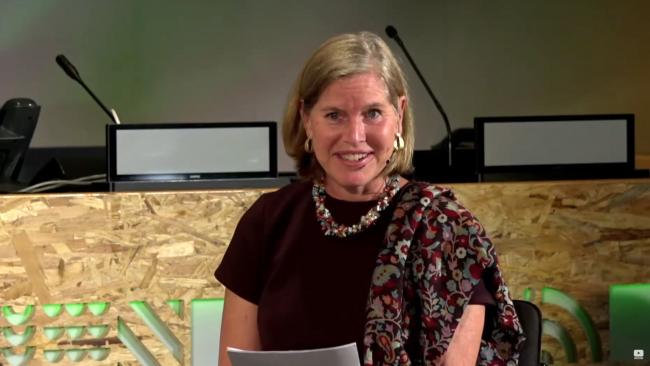Time for Action: Integrated Efforts for a Healthy Planet and People
How do we translate words into action so that we will be “living in harmony with nature by 2050” as envisioned by the Post-2020 Biodiversity Framework? Panelists from the UN Convention Secretariats, the Global Environment Facility (GEF), and governments unpacked potential actions for future multilateral action in this Flagship Event hosted by the GEF and the UN Environment Programme (UNEP). Some of the panel’s proposed actions to ensure a healthy planet and people were summarized by moderator Susan Gardner, UNEP, who said: “We know what we need to do, for that we have the roadmap. We have to work together and be more integrative. We need to have more transformative, systemic change. We have to mobilize finance and use it smartly. We have to mobilize our entrepreneurs, our communities, and decision makers, to all work together to shift the needle towards living in harmony with nature. And we have to step out of traditional ways of thinking and work across disciplines borders, levels, and sectors.”
Stating that “together we can end the triple planetary crisis of biodiversity loss, climate change, and pollution,” UNEP’s New York Office Director Ligia Noronha identified four gaps to achieving a green pandemic recovery:
- the implementation gap, through which national governments deliver more and solid policies that require swift follow-up action;
- the financing gap, requiring at least an increase of 143% in funds to meet all biodiversity, land restoration, and climate change targets, and amplifying both public and private investments;
- the inclusivity gap that requires space for all voices to be heard, including those of Indigenous Peoples and youth; and
- the integration gap, which is fundamental to overcome as the solutions to climate change, nature loss, and pollution are so intertwined with the each other, the economy, business, and society.
Reminding participants that the first political solution 50 years ago was to create environmental agencies and legal frameworks, Carlos Manuel Rodriguez, CEO and Chairperson, GEF, applauded the fact that “we already have 50 years under our belt.” He called for real integration of all these mechanisms, saying we should not assume that creating a new agency for every problem identified in natural resource management is the right solution. He noted this has led to working in silos without any complementarity within national governments, and said “now is the right moment for a paradigm shift from an institutional viewpoint.”
On flow and availability of funding, Elizabeth Mrema, Executive Secretary, Convention on Biological Diversity (CBD), suggested repurposing funds away from perverse subsidies towards nature-positive actions and creating appropriate policies and regulations. She called for an enabling environment that considers the mantra “by the market for the market” through assessment of risks to nature, and impacts and dependencies on nature.
On successful innovations in the chemicals and waste sector, Rolph Payet, Executive Secretary, Basel, Rotterdam and Stockholm (BRS) Conventions, noted the initial difficulty of migrating from ancient electrical transformers for most countries, as it involved a large investment in renewable energy innovation. He suggested the renewable energy and waste sectors can have a significant impact by integrating their approaches. Using the refrigeration transformation caused by the Montreal Protocol, he said the BRS frameworks are opportunity-generating instruments, by creating new markets and products as solutions.
On successes and lessons in the context of mercury that can be scaled up, Monika Stankiewicz, Executive Secretary, Minamata Convention, highlighted the impact of artisanal small-scale gold mining on sensitive ecosystems, noting the complexity of interrelated issues that require environmental, political, and societal efforts, as well as a great deal of flexibility. She said it is important to formalize the informal sector, rather than criminalize it.
Yasmine Fouad, Minister of Environment, Egypt, said mobilizing communities requires ensuring they have ownership of the resources and engage in a fully participatory partnership to achieve national targets. She urged involving Indigenous communities in the protected areas where they live by creating market opportunities and including their Indigenous knowledge in managing natural resources, while not forgetting approaches that empower women by providing credit for female-led enterprises.
In their concluding remarks, Elizabeth Mrema reflected on the many achievements through the multilateral environment agreements, but called for a focus on enforcement over the next 50 years to avoid talking about the same challenges in 2072. Rolph Payet recalled the cost to human health due to pollution and food insecurity, saying “we need to look at the business case for sustainability to turn the tide on climate change. We need to get out of this ‘circle’ and move to circular economies.” Pledging strong support for the Post-2020 Biodiversity Framework, Monika Stankiewicz said the Minamata Convention has pledged to work in concert with all other Conventions. Carlos Manuel Rodriguez reflected on the challenge of integration at the global level. Citing the lack of collaboration between global environmental funds and global environmental agencies, he called for “thinking out of the box” to consider an overarching global agreement on the environment.
To receive free coverage of global environmental events delivered to your inbox, subscribe to the ENB Update newsletter.


